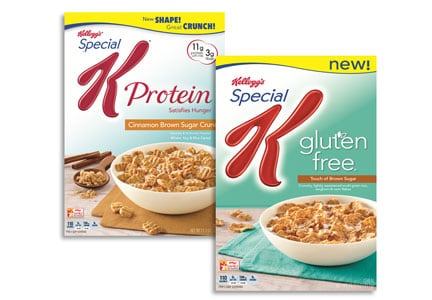“We’ve never seen consumers as confused” (about what is ‘good for you’), said PepsiCo Chairman and CEO Indra Nooyi, in a recent interview. And not long ago Kellogg’s CEO John Bryant told investors that one reason for the decline of the cereal category is: “I think consumers are changing their views on weight management from ‘reduce calories’ to ‘nutritious foods’."
The nutrition trend is hitting mass-market brands
When the leaders of the worlds biggest food companies start to blame consumers for the falling sales of their “healthy” brands we know something is fundamentally wrong with their marketing – it’s not keeping up with what consumers expect from their foods. If consumers are shifting from counting calories to looking for the right nutrition, as in the Kellogg’s case, then it clearly means that the nutrition trend has reached the mass market and that it’s hitting mass-market brands like Kellogg’s and whole categories like cereals and soft drinks.
Acceptance of ingredients more important than health benefits
Pepsi Co faces the challenge of redefining their ‘Good For You’ as they see consumers turning their attention to real sugar, organic and non-gmo. With one word consumers are turning their attention to ingredients before they even look at claimed benefits. Marketing needs to focus on nutrition as admitted by Kelloggs CEO John A. Bryant.

“Special K can absolutely meet that criteria. It’s a very nutrient dense food form. But we haven’t been communicating it in that way...”
Clear evidence the marketing skills of mass market companies are often not up to speed with market place evolution. The marketers haven’t understood the brutal but simple difference between food and nutrition marketing. Nutrition marketing starts with the ingredients.
Nutrition marketing proven by academic research
The four success factors I have isolated for consumer choice of a healthy product are defined as:
- Need the product
- Accept the ingredient
- Understand the benefit
- Trust the brand
The order surprised traditional marketers but was proven again and again in global practice. In 2012 a research team at Maastricht University in the Netherlands under professor Fred Brouns concluded the acceptance of the ingredient was critical for consumer understanding of health claims.
Consumer education key to understanding of health claims

The consequence of this is a fundamental blow to the belief in health claims as a magic bullet. Or as one ingredient company executive said: “We invested years and millions in getting an approved health claim. We thought it would give us success in the market. But if consumers haven’t heard about the ingredient and don’t even understand the benefit then there is no market.”
Bottom line: Consumer education must go before health claims.
Wennstrom will present some of his ideas at Vitafoods Europe in Geneva next week. He is the author of several books including FourFactors for Growth market Success.
